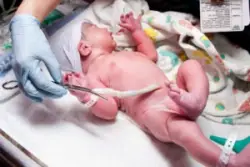
A stillbirth research organization reported that umbilical cord accidents are responsible for about 10 percent of infant deaths. While medical experts often tell expectant parents that umbilical cord issues are rare, you may feel that this is not the case and wish to pursue an investigation.
Cord abnormalities can be identified through routine doctor visits, ultrasounds, or by feeling signs of fetal distress. If a hospital or medical professional fails to evaluate this properly, you may qualify to file a medical negligence lawsuit for just compensation.
In this article, we will share the commonly asked questions regarding umbilical cord complications, including the different types, treatment options, and how rare umbilical cord accidents truly are.
Can I Sue the Hospital for Umbilical Cord Complications that Happened During My Pregnancy?
If umbilical cord complications occur and the medical facility fails to administer the proper duty of care to your child, you can find a birth injury lawyer near you to review your case and file a lawsuit.
Umbilical cords can become restricted in some way, causing the newborn to be deprived of oxygen and other essentials. If not recognized and treated properly, an umbilical cord accident may occur during pregnancy, labor, or delivery, and might risk the life and health of the unborn child, such as:
- Umbilical cord prolapse
- Umbilical cord compressions
- Nuchal cord
- Cord torsion
- Umbilical cord knot
- Vasa Previa
- Short umbilical cord
- Umbilical cord infection
"If your child was born with a birth injury, or cerebral palsy, we can help."
Can I Take Legal Action if My Child’s Umbilical Cord Accident Was Mistreated?
If incorrect or no medical action is taken, you have the right to pursue legal action for your child’s umbilical cord accident. Early detection is essential for all umbilical cord issues, and immediate intervention should be taken when there are indications of fetal distress. Fetal heart rate monitoring and many other prenatal tests can detect indicators of fetal distress.
Umbilical cord accidents are less likely to be detected before labor. Most often, it is noticed during labor and delivery, when the medical team may change the mother’s posture to ease strain or tension off the cord if it hasn’t already broken, supply more oxygen to the baby to address the interruption of oxygen, hydrate the infant through IV, or deliver the child via C-section.
Can I Still File a Claim if I Showed Warning Signs of Umbilical Cord Abnormalities?
Despite the fact that umbilical cord accidents happen at random, the medical care received to preserve your child’s life should be thorough and done efficiently. While there are warning signs for umbilical cord abnormalities, you may still be eligible for compensation if an accident occurs. Birth injury lawyers represent clients whose warning signs include the following:
- A greater risk of cord compression being linked to fetal hyperactivity like jerking, or hiccups
- Umbilical cords without the twisted, rope-like look are frequently a sign of a higher mortality risk
- Vasa Previa, which is more likely to occur in women who have had in vitro fertilization (IVF), are expecting several children, or have placenta previa, a condition in which the placenta partially or completely covers the cervix
Some of these symptoms, like fetal hyperactivity, may need an ultrasound, while others, like Vasa Previa, may be picked up during standard prenatal treatment.
"We know first-hand what you are going through."
Is Wrongful Death Common from an Umbilical Cord Accident?
Neonatal wrongful deaths caused by umbilical cord accidents are as infrequent as the details and research examining umbilical cord abnormalities. Studies show that cord abnormalities hold a 19% risk factor in stillbirths, but there is still very little evidence to prove what causes these irregularities.
"Our Birth Injury Lawyers have recovered over $750+ Million on behalf of our clients."
Can I Qualify for Compensation if I Am at High Risk for an Umbilical Cord Accident?
Yes, your ability to collect compensation for medical negligence will only be impacted if it is proven that the medical care received was accurately done. While it is impossible to quantify if high-risk pregnancies correlate with umbilical cord fatalities, a birth injury attorney can assist with cases that include the following increased risks:
- The umbilical cord is twisted unnaturally if the fetus is in the breech position, foot first
- The umbilical cord positioning itself in a way that Vasa Previa disease might lead it to get so constructed that it breaks
- The cord twisting and knotting if it is extremely lengthy
- The uterine wall and the developing fetus are painfully pressed together by the umbilical cord if there is insufficient amniotic fluid
- Cysts, masses, or pre-existing conditions like hematomas increase the risk of abnormalities
- When several children are born at once, the chord may experience increased stress
Expectant parents must be attentive to any hyperactivity during pregnancy that lasts for longer periods of time. Ensure to contact your doctor and document their responses to your concerns throughout the pregnancy. Since this accident can not be prevented, if your baby experiences this birth injury, doctors will have to work quickly and accurately to ensure a non-fatal delivery.
What Compensation Is Available if My Child Has Long-Term Complications from an Umbilical Cord Accident?
Your child’s pain and suffering will have a monetary value determined by the umbilical cord birth injury attorney managing your child’s case. Calculating pain, suffering, and other non-economic or intangible losses can be done in a number of different ways.
Attorneys frequently use multipliers to estimate the value of a client’s pain and suffering damages. Hiring legal help increases the rarity of your umbilical cord accident settlement being diminished. This is accomplished by increasing all or a portion of their economic damages—such as the cost of medical care—by a predetermined quantity.
"We are committed to helping families who have suffered medical negligence."

